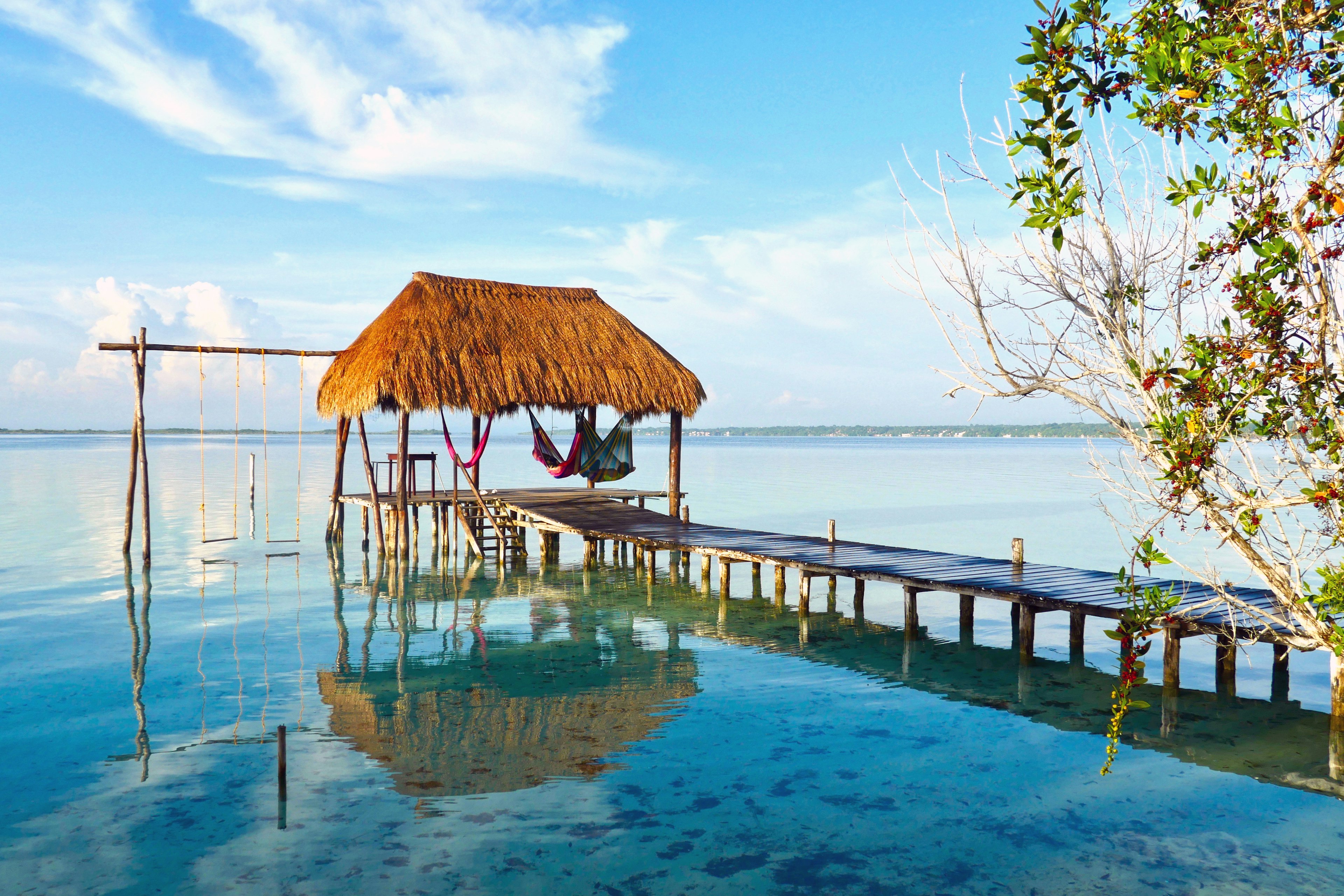Cancún is the perfect winter destination for all the obvious reasons. Blessed with 240 days of sunshine a year, it also gets very little rain over the winter months (from December to April) making this a prime time to visit without the spring and summer vacation crowd.
Lined with high-rise resorts facing spectacular white-sand beaches, Cancún is also a famous for its raucous nightlife. But just beyond the glittering lights and pool bars, incredible day trips abound: from Maya ruins and cobblestoned towns to explore, plus wildlife reserves and vibrant coral reefs to snorkel.
Grab your day pack, charge your phone and get ready to hit the road. Here are the best day trips from Cancún to soak up some culture as well as some sunshine this winter.
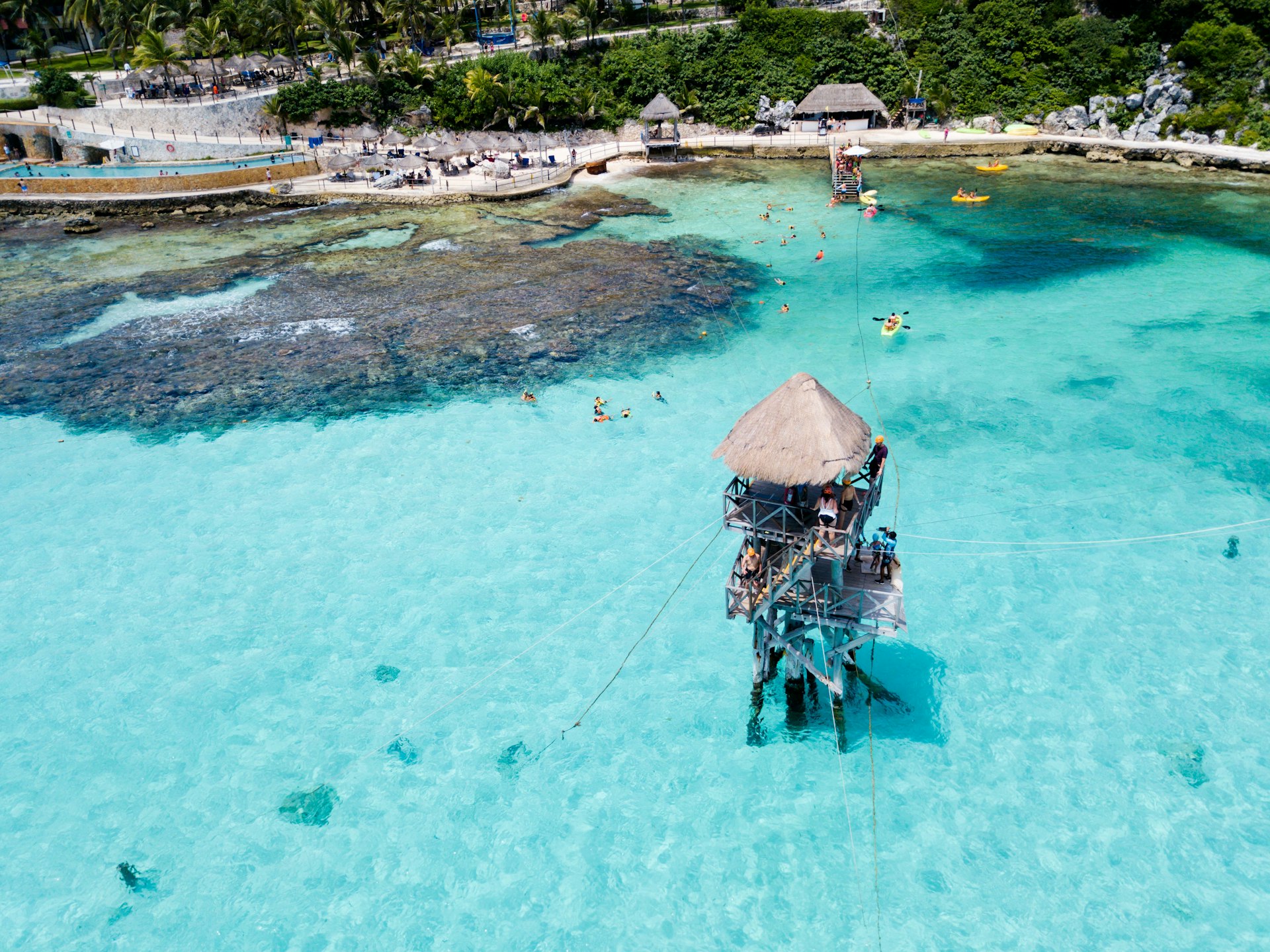
Isla Mujeres for perfect beaches, sea turtles and snorkelling
Just across the bay from Cancún, Isla Mujeres is a small, laid-back island with a vibrant pedestrian-only main street and murals galore. Playa Norte is the shining star here, a spectacular sugar-white sand beach with calm turquoise waters that descend so slowly they seem forever waist-deep. Rent a golf cart to explore the 4.3-mile-long island, making sure to stop at the Isla Mujeres Turtle Farm to see and learn about endangered sea turtles; Playa Garrafón for its excellent snorkeling (rentals available on-site); and Punta Sur, the southern tip of the island with a striking sculpture garden and a small Maya temple dedicated to Ixchel, the goddess of fertility. If you’re visiting between May and September, book a trip to snorkel with whale sharks, a once-in-a-lifetime experience to swim alongside these gentle giants.
How to get to Isla Mujeres: It’s a quick 15-minute ferry ride to Isla Mujeres from Gran Puerto and Puerto Juárez, just north of downtown Cancún. The R-1 city bus, which passes through the Zona Hotelera, stops at both docks. More convenient, but twice the price and distance, are ferries that leave from the Zona Hotelera at Playa Tortugas and Playa Caracol.
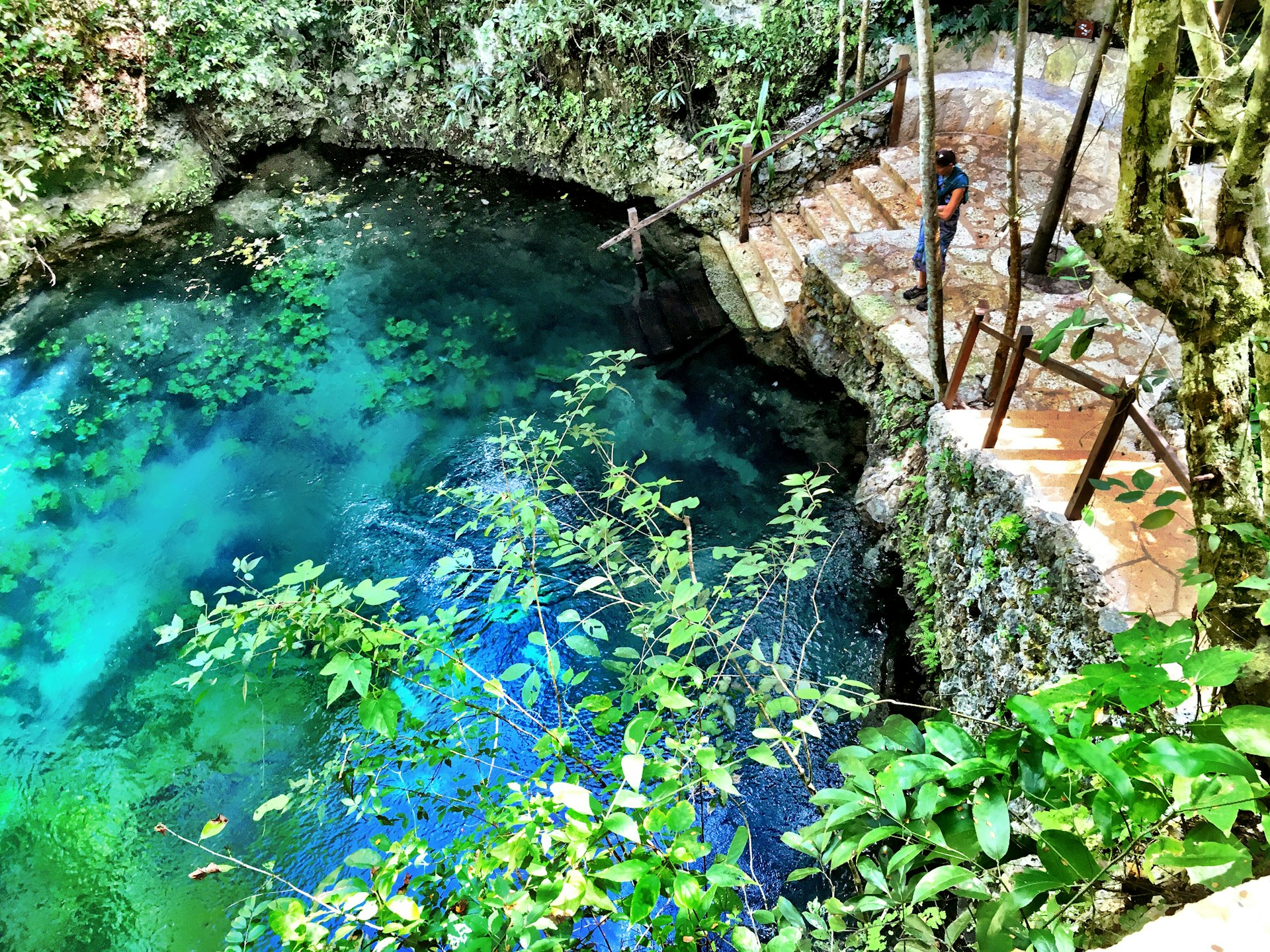
Hop between underground swimming holes on the Ruta de los Cenotes
Ruta de los Cenotes is a 23-mile paved road that winds past a spectacular series of cenotes (sinkholes). These crystal clear pools of water are found throughout the region; some are on the surface surrounded by jungle, while others are deep in stalactite-filled caves. Along this road, visitors can spend the day cenote hopping, following signage down dirt roads to different sites. Favorites include Siete Bocas, an underground cenote with several openings in its limestone ceiling, shafts of light dramatically brightening the cool, clear waters; and Verde Lucero, a teal blue swimming hole surrounded by towering trees and thick vegetation, schools of tiny fish and freshwater turtles making it their home. For those who appreciate a one-stop shop experience, the route’s commercial "eco-parks" are the way to go: Boca del Puma and Cenote Zapote Ecopark have several cenotes each, plus extras like ziplines and ATV tours.
How to get to Ruta de los Cenotes: The official start of the route is 35 minutes from Cancún by car – it’s marked by a huge stone archway on the coastal highway, just south of Puerto Morelos. There is no public transportation along the route, but organized tours are common.
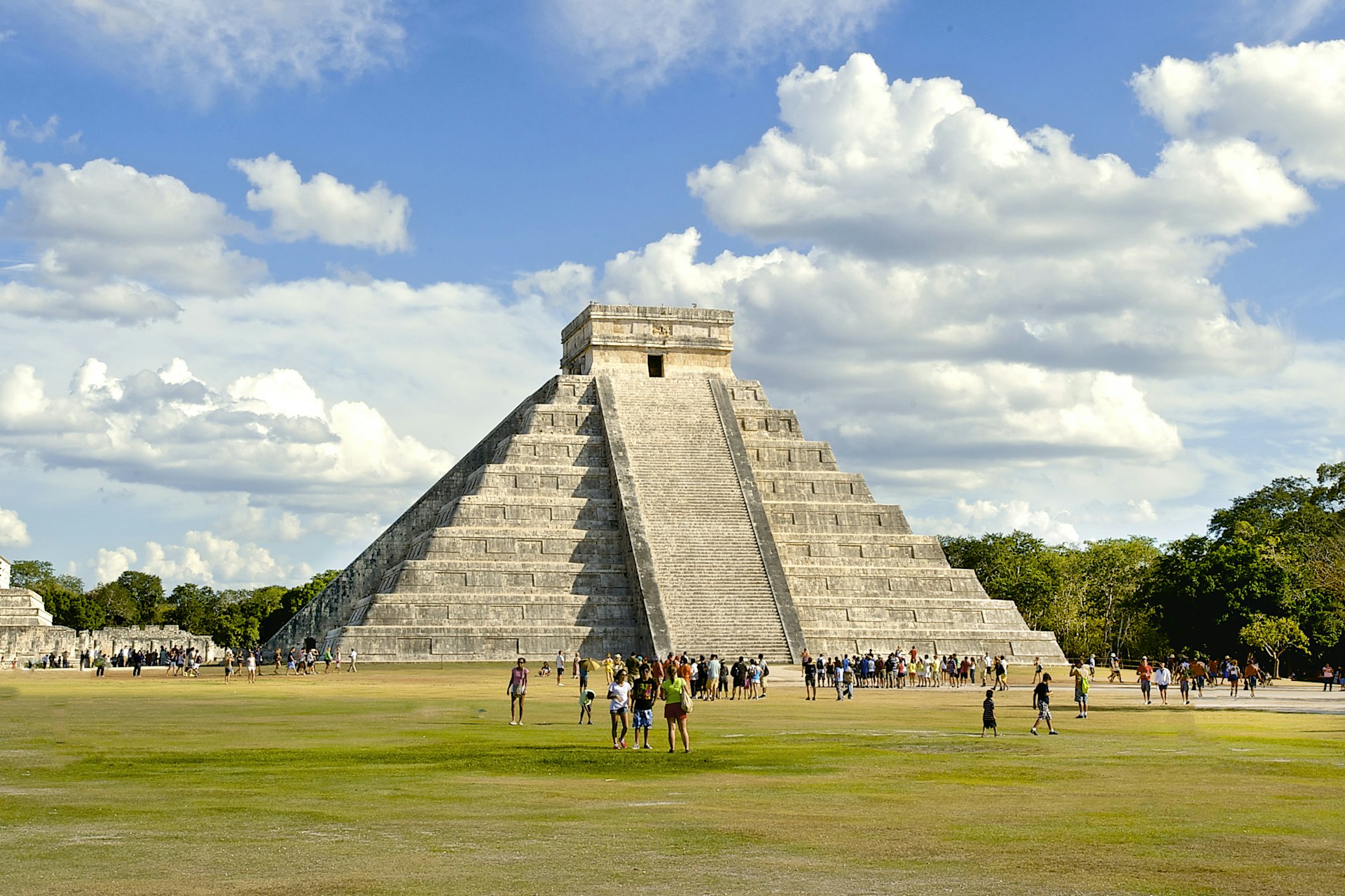
Explore one of the New Seven Wonders of the World: Chichén Itzá
One of the New Seven Wonders of the World, Chichén Itzá is perhaps the most visited archaeological zone in the Maya world – and with good reason. It is a majestic site with iconic structures such as the towering temple of El Castillo, where a light-and-shadow illusion of a serpent can be seen descending its staircase during the vernal and autumnal equinoxes; El Caracol, the domed observatory once used to track the orbit of Venus and other planets and stars; and the Gran Juego de Pelota, the largest ball court in all of Mesoamerica. Arrive early to beat the heat and the crowds. If you’re staying overnight, come back in the evening to enjoy the brilliant sound-and-light show, a short history of the Maya projected on the site’s most prominent structures.
How to get to Chichén Itzá: By car, it’s 2.5 hours to Chichén Itzá on a well-maintained toll road (cuota). On the return trip, consider taking the free highway (libre), which passes through small Maya communities, offering opportunities to stop at roadside stands to buy fresh fruit and handmade souvenirs. First-class buses travel directly to the ruins from Cancún too.

Live out your Caribbean dreams in Tulum
The beaches of Tulum are what Caribbean dreams are made of: soft white sand and impossibly blue waters, swaying palm trees and thatch-roof bungalows. A chilled-out vibe permeates the place in everything from its beach clubs and restaurants to its long stretches of sand filled with beachgoers. At the northern end of the beach, Tulum’s namesake Maya ruins are perched dramatically on seaside cliffs, overlooking the ocean. On the southern end, is the Sian Ka’an Biosphere Reserve, a Unesco World Heritage site spanning 1.3 million acres, home to a spectacular array of creatures, from dolphins and crocodiles to spider monkeys and flamingoes. A guided tour is the best way to explore it. Snorkeling or diving in nearby caves and caverns fed by the world’s longest underground river system adds an unforgettable twist to your visit.
How to get to Tulum: Tulum is just under a two-hour drive from Cancún, a straight shot south along the modern coastal highway. Public transportation is available to Tulum town and the ruins. If you’re headed to the beach, catch a cab or colectivo (public shuttle) on the main drag once you’re in town.
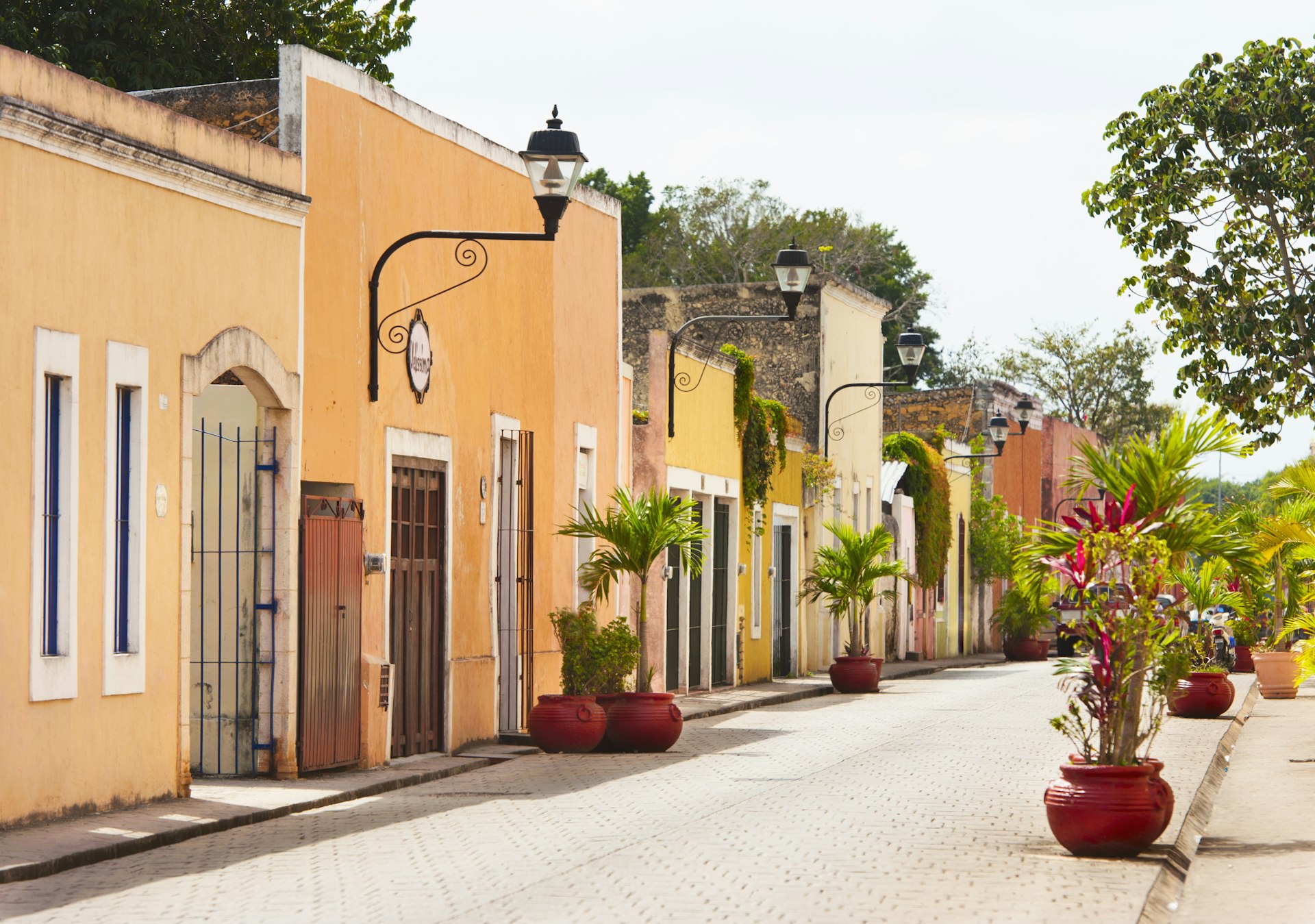
Taste a slice of Yucatecán life in Valladolid
Valladolid is a colonial town in the heart of the Yucatán Peninsula. It has historic buildings and lovely churches, as well as dramatic underground cenotes filled with crystal clear water, including some right in the middle of town. Meander down the Calzada de los Frailes, a cobblestone street draped in bougainvillea and dotted with artisanal boutiques and cozy cafés. Tour the Templo de San Bernardino, a Franciscan church that doubled as a fortress during the Caste War. Don't miss a visit to the Casa de los Venados, a 17th-century casona (mansion), housing an impressive collection of Mexican folk art. In the heat of day, join locals for a swim in the cool waters of the cenote at Hacienda San Lorenzo Oxman. In the evening, enjoy a stroll and esquite (corn in a cup) in the central plaza, taking in the free traditional music and dance performances, a slice of Yucatecán life.
How to get to Valladolid: Valladolid is two hours by car from Cancún on a toll road, or a bit longer on the free highway. Nonstop bus service from Cancún is also offered several times daily.
You might also like:
Cancún on a budget: the best free (and almost free!) things to do in party city
Top things to do in Cancún
The best ways to get around Cancun, Mexico's beach playground

